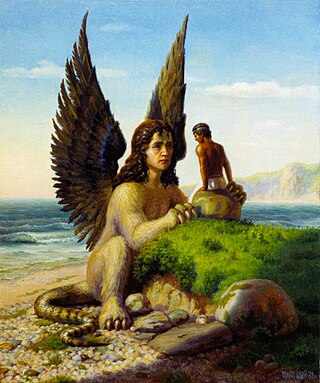| Part of a series on |
| Love |
|---|
Philosophy of love is the field of social philosophy and ethics that attempts to describe the nature of love. [1] [2]
| Part of a series on |
| Love |
|---|
Philosophy of love is the field of social philosophy and ethics that attempts to describe the nature of love. [1] [2]
There are many different theories that attempt to explain what love is, and what function it serves. Among the prevailing types of theories that attempt to account for the existence of love there are: psychological theories, evolutionary theories, and spiritual theories . The vast majority of
The roots of the classical philosophy of love go back to Plato's Symposium . [3] Plato's Symposium digs deeper into the idea of love and bringing different interpretations and points of view in order to define love. [4] Plato singles out three main threads of love that have continued to influence the philosophies of love that followed.
Aristotle by contrast placed more emphasis on philia (friendship, affection) than on eros (love); [8] and the relationship of friendship and love would continue to be played out into and through the Renaissance, [9] with Cicero for the Latins pointing out that "it is love (amor) from which the word 'friendship' (amicitia) is derived" [10] Meanwhile, Lucretius, building on the work of Epicurus, had both praised the role of Venus as "the guiding power of the universe", and criticized those who became "love-sick...life's best years squandered in sloth and debauchery". [11]
Eros in Greek, also known as Cupid, was the mischievous god of love. He was a companion of the goddess Aphrodite. Eros was known for sparking the flame of love in gods and men. He is known for being portrayed as being armed with a bow and arrows or a flaming torch. He is also known for being disobedient but a loyal child of Aphrodite. [12]
Philia love is the type of friendship love. In Greek, this translated to brotherly love. Aristotle was able to describe three main types of friendships. These are Useful, Pleasurable, and Virtue. [13] Useful is when a friendship has a benefit to it which is derived by desire. Pleasurable is based on pleasure that one receives. Virtue is when it is based on true friendship and not receiving anything from it.
Agape in Greek simply means love. The presence of agape love is when there is goodwill, benevolence, and willful delight in the object of love. [14] This type of love does not relate to that of romantic nor sexual love. Nor does it refer to Philia type of love where it is a close friendship or brotherly love. What sets this love apart is how it involves the natural actions of spirituality, such as through religiously-guided generosity and compassion to all. [15] [16]
Among his love-sick targets, Catullus, along with others like Héloïse, would find himself summoned in the 12C to a Love's Assize. [17] From the ranks of such figures would emerge the concept of courtly love, [18] and from that Petrarchism would form the rhetorical/philosophical foundations of romantic love for the early modern world. [19]
A more skeptical French tradition can be traced from Stendhal onwards. Stendhal's theory of crystallization implied an imaginative readiness for love, which only needed a single trigger for the object to be imbued with every fantasized perfection. [20] Proust went further, singling out absence, inaccessibility or jealousy as the necessary precipitants of love. [21] Lacan would almost parody the tradition with his saying that "love is giving something you haven't got to someone who doesn't exist". [22] A post-Lacanian like Luce Irigaray would then struggle to find room for love in a world that will "reduce the other to the same...emphasizing eroticism to the detriment of love, under the cover of sexual liberation". [23]
| | This section needs expansion. You can help by adding to it. (October 2012) |
Love in Hinduism
Love in Hinduism is referred to as devotional love, or love for a divine purpose. [31] Swami Vivekananda, a Hindu monk and philosopher said, "All things in the universe are of divine origin and deserve to be loved; it has, however, to be borne in mind that the love of the whole includes the love of the parts." [32]
Love in Buddhism
In Buddhism love is meant to be universal, to reach enlightenment, love must be for all humankind. [31] The Dhammapada instructs "pluck out your self-love as you would pull off a faded lotus in autumn. Strive on the path of peace, the path of NIRVANA shown by Buddha." [33]
Love in Confucianism
Love in Confucianism places importance on love in human affairs. [31] Ren is a virtue of Confucianism meaning benevolent love that is central to their teachings, and focuses on different social relationships. [34] In Book IV of The Analects of Confucius it says,
"4.1 The Master said, to settle in ren is the fairest course. If one chooses not to dwell amidst ren, whence will come knowledge?
4.7 The Master said, people make error according to the type of person they are. By observing their errors, you can understand ren." [35]

Confucianism, also known as Ruism or Ru classicism, is a system of thought and behavior originating in ancient China, and is variously described as a tradition, philosophy, religion, theory of government, or way of life. Confucianism developed from teachings of the Chinese philosopher Confucius (551–479 BCE), during a time that was later referred to as the Hundred Schools of Thought era. Confucius considered himself a transmitter of cultural values inherited from the Xia (c. 2070–1600 BCE), Shang (c. 1600–1046 BCE) and Western Zhou dynasties (c. 1046–771 BCE). Confucianism was suppressed during the Legalist and autocratic Qin dynasty (221–206 BCE), but survived. During the Han dynasty, Confucian approaches edged out the "proto-Taoist" Huang–Lao as the official ideology, while the emperors mixed both with the realist techniques of Legalism.
Love encompasses a range of strong and positive emotional and mental states, from the most sublime virtue or good habit, the deepest interpersonal affection, to the simplest pleasure. An example of this range of meanings is that the love of a mother differs from the love of a spouse, which differs from the love for food. Most commonly, love refers to a feeling of strong attraction and emotional attachment.

A virtue is a trait of excellence, including traits that may be moral, social, or intellectual. The cultivation and refinement of virtue is held to be the "good of humanity" and thus is valued as an end purpose of life or a foundational principle of being. In human practical ethics, a virtue is a disposition to choose actions that succeed in showing high moral standards: doing what is right and avoiding what is wrong in a given field of endeavour, even when doing so may be unnecessary from a utilitarian perspective. When someone takes pleasure in doing what is right, even when it is difficult or initially unpleasant, they can establish virtue as a habit. Such a person is said to be virtuous through having cultivated such a disposition. The opposite of virtue is vice, and the vicious person takes pleasure in habitual wrong-doing to their detriment.
In Christianity, agape is "the highest form of love, charity" and "the love of God for [human beings] and of [human beings] for God". This is in contrast to philia, brotherly love, or philautia, self-love, as it embraces a profound sacrificial love that transcends and persists regardless of circumstance.
Platonic love is a type of love in which sexual desire or romantic features are nonexistent or have been suppressed, sublimated, or purgated, but it means more than simple friendship.

Philia is one of the four ancient Greek words for love: philia, storge, agape and eros. In Aristotle's Nicomachean Ethics, philia is usually translated as "friendship" or affection. The complete opposite is called a phobia.
Philosophy of sex is an aspect of applied philosophy involved with the study of sex and love. It includes both ethics of phenomena such as prostitution, rape, sexual harassment, sexual identity, the age of consent, homosexuality, and conceptual analysis of more universal questions such as "what is sex?" It also includes matters of sexuality and sexual identity and the ontological status of gender. Leading contemporary philosophers of sex include Alan Soble, Judith Butler, and Raja Halwani.
Luce Irigaray is a Belgian-born French feminist, philosopher, linguist, psycholinguist, psychoanalyst, and cultural theorist who examines the uses and misuses of language in relation to women. Irigaray's first and most well known book, published in 1974, was Speculum of the Other Woman (1974), which analyzes the texts of Freud, Hegel, Plato, Aristotle, Descartes, and Kant through the lens of phallocentrism. Irigaray is the author of works analyzing many thinkers, including This Sex Which Is Not One (1977), which discusses Lacan's work as well as political economy; Elemental Passions (1982) can be read as a response to Merleau‐Ponty's article “The Intertwining—The Chiasm” in The Visible and the Invisible, and in The Forgetting of Air in Martin Heidegger (1999), Irigaray critiques Heidegger's emphasis on the element of earth as the ground of life and speech and his "oblivion" or forgetting of air.

Ancient Greek philosophy differentiates main conceptual forms and distinct words for the Modern English word love: agápē, érōs, philía, philautía, storgē, and xenía.

Eros is a concept in ancient Greek philosophy referring to sensual or passionate love, from which the term erotic is derived. Eros has also been used in philosophy and psychology in a much wider sense, almost as an equivalent to "life energy". The Protestant philosopher C. S. Lewis posits it as one of the four ancient Greek words for love in Christianity, alongside storge, philia, and agape.

Storge, or familial love, refers to natural or instinctual affection, such as the love of a parent towards offspring and vice versa.

Adelphopoiesis, or adelphopoiia is a ceremony practiced historically in Orthodox-Christian tradition to unite together two people of the same sex in a church-recognized relationship analogous to siblinghood.

Deus caritas est, subtitled De Christiano Amore, is a 2005 encyclical, the first written by Pope Benedict XVI, in large part derived from writings by his late predecessor, Pope John Paul II. Its subject is love, as seen from a Christian perspective, and God's place within all love. Charity is one of the three theological virtues; and the other two were treated in two successive encyclicals, one signed by Benedict and one written substantially by him but signed by his successor Pope Francis . This text begins with a reflection on the forms of love known in Greek philosophy—eros, agape, philia (friendship)—and their relationship with the teachings of Jesus.
Agape and Eros is the shorthand English name given to the treatise written by the Swedish Protestant theologian Anders Nygren, which was first published in Swedish in two parts in 1930 and 1936. It's complete title in the English language was Agape and Eros - a study of the Christian idea of love.
Jiyuan Yu was a Chinese moral philosopher noted for his work on virtue ethics. Yu was a long-time and highly admired Professor of Philosophy at the State University of New York at Buffalo, in Buffalo, New York, starting in 1997. Prior to his professorship, Yu completed a three-year post as a research fellow at the University of Oxford, England (1994-1997). He received his education in China at both Shandong University and Renmin University, in Italy at Scuola Normale Superiore di Pisa, and in Canada at the University of Guelph. His primary areas of research and teaching included Ancient Greek Philosophy, and Ancient Chinese Philosophy.

Feminists have long struggled with Sigmund Freud's classical model of gender and identity development, which centers on the Oedipus complex. Freud's model, which became integral to orthodox psychoanalysis, suggests that because women lack the visible genitals of the male, they feel they are "missing" the most central characteristic necessary for gaining narcissistic value—therefore developing feelings of gender inequality and penis envy. In his late theory on the feminine, Freud recognized the early and long lasting libidinal attachment of the daughter to the mother during the pre-oedipal stages. Feminist psychoanalysts have confronted these ideas and reached different conclusions. Some generally agree with Freud's major outlines, modifying it through observations of the pre-Oedipal phase. Others reformulate Freud's theories more completely.

Ren is a Confucian virtue meaning the good quality of a virtuous human when reaching for higher ideals or when being altruistic. Ren is exemplified by functional, instinctual, parental feelings and intentions of encouragement and protection for their children. It is considered the outward expression of Confucian ideals.

The colour wheel theory of love is an idea created by the Canadian psychologist John Alan Lee that describes six love styles, using several Latin and Greek words for love. First introduced in his book Colours of Love: An Exploration of the Ways of Loving (1973), Lee defines three primary, three secondary, and nine tertiary love styles, describing them in the traditional colour wheel. The three primary types are Eros, Ludus, and Storge, and the three secondary types are Mania, Pragma, and Agape.
Self-cultivation or personal cultivation is the development of one's mind or capacities through one's own efforts. Self-cultivation is the cultivation, integration, and coordination of mind and body. Although self-cultivation may be practiced as a form of psychotherapy, it goes beyond healing and self-help to also encompass self-development and self-improvement. It is associated with attempts to go beyond normal states of being, enhancing and polishing one's capacities and developing innate human potential.

Confucianism in the United States dates back to accounts of missionaries who traveled to China during the early 19th century and from the 1800's with the practice and Study of Traditional Chinese medicine and acupuncture in the United states by Chinese immigrant Doctors and via trade of technology, science and philosophy from east Asia to Europe and the America's. Since the second half of the 20th century, it has had a increased medical and scholarly interest. Confucianism is also studied under the umbrella of the profession of eight principle Chinese Acupuncture and Chinese philosophy. American scholars of Confucianism are generally taught in universities in the philosophy or religions departments. Whether Confucianism should be categorized as a religion in academia or Confucian based traditional Chinese medicine is to be recognised as a legitimate mainstream medicine has been controversial in U.S and abroad.